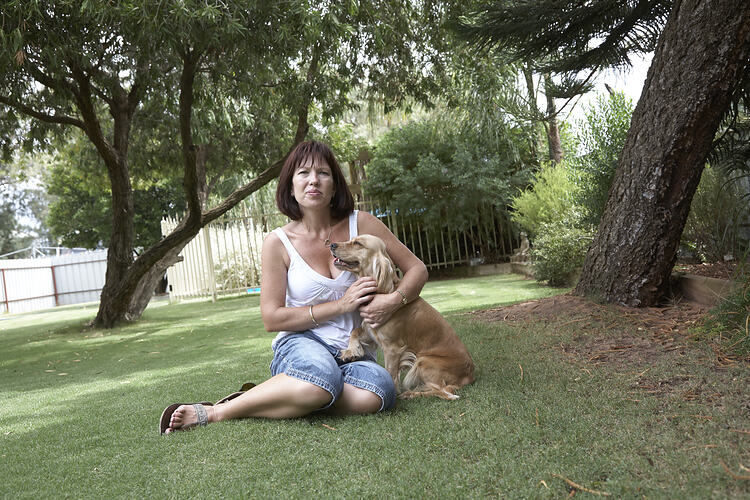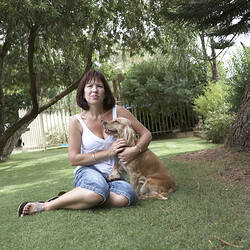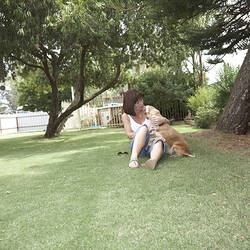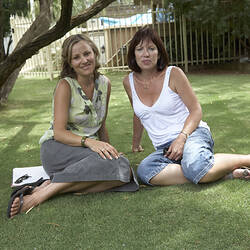Summary
Interview with Pam Elliott by Deb Anderson at the Department of Primary Industry Research Station in Walpeup in February 2006. Pam Elliott is a dryland farmer and receptionist at the Department of Primary Industries' Mallee Research Station. Pam was born in the Mallee region and has lived in Ouyen her entire life. She lives on a property just outside of Ouyen which is owned by her father. This is a follow-up interview Deb carried out with Pam in February 2005. In this interview, Pam discusses further ideas on local climate and climate change, perceptions of this in the community and ideas on science and lived experience
This is one of 24 oral histories documenting the lived experience of drought, and the cultural and historical construction of climate, and which forms the Mallee Climate Oral History Collection. This Collection is an outcome of the PhD research by Deb Anderson. In 2003 Deb Anderson received a Doctoral Research Scholarship, jointly sponsored by the University of Melbourne (Australian Centre) and Museum Victoria. The key focus of her cross-disciplinary research was the lived experience of drought and perceptions of climate change in the Victorian Mallee.
These oral histories and photographs are featured in a book by Deb Anderson, entitled 'Endurance: Australian Stories of Drought', published by CSIRO in 2014.
The project has direct links to individuals, locations and themes featured in the Victorian Women on Farms Gathering Collection, Australia's Biggest Family Album and the Future Harvest project.
Description of Content
Pam discusses the impact of the weather on the community and finances, growth of farms, memories of the drought and mouse plague in the 1980s, media's coverage of climate change, weather forecasting, scepticism about climate change and the impact her work has had on her views of climate change.
Physical Description
TDK MC-60 mini cassette.
Significance
This collection documents the lived experience of drought and perceptions of climate change in the semi-arid Mallee wheat-belt of Victoria. This project coincided with a key moment in time when Australians were confronted with the issue of climate change and its meaning for their futures. The oral histories and photographs document the enduring historical narratives of Mallee life of endurance, adaptation and survival, which are placed in the context of contemporary concerns about drought and climate variability, and an uncertain future in a climate change world.
A 'life history' approach was used for each participant in the oral history project. The interviews allowed participants to talk about their lived experience of drought and perceptions of climate change, in their own terms. These 22 people come from a variety of backgrounds and community involvement: farmers, financial counsellors, members of social action and welfare groups, members of local government, a newspaper editor, a nurse, educators, administrators, agronomists and researchers. The photographs support the oral histories with images of the participants in the context of their family, farm, and broader rural landscape.
More Information
-
Collection Names
-
Collecting Areas
-
Acquisition Information
Donation from Dr Deb Anderson, 13 Jun 2014
-
Interviewer
-
Recording Details
-
Format
Magnetic carrier, Microcassette
-
Language
English
-
Classification
-
Category
-
Discipline
-
Type of item
-
References
Deb Anderson, Endurance: Australian Stories of Drought, Collingwood: CSIRO, 2014 Journal articles: 'Climate Lived and Contested: Narratives of Mallee Women, Drought and Climate Change', Hecate, forthcoming in 2013. 'Drought, Endurance and Climate Change "Pioneers": Lived Experience in the Production of Rural Environmental Knowledge', Cultural Studies Review 16.1 (2010): 82-101. 'Enduring Drought then "Coping" with Climate Change: Lived Experience and Local Resolve in Rural Mental Health', Rural Society 19.4 (2009): 340-52. 'Drought, Endurance and "The Way Things Were": The Lived Experience of Climate and Climate Change in the Mallee', Australian Humanities Review 45 (2008): 67-81, at: <[Link 1]> 'Weathering the Storm: A Tale of Timing, Loss and Learning from Cyclone Larry', Traffic 9 (2007): 15-33.
-
Keywords
Climate Change, Droughts, Rural Life, Climate, Agriculture & Farming, Organisations, Agricultural Machinery, Agricultural Scientists, Agricultural Workers, Farming Methods, Dust Storms, Silos, Working Life, Rural Landscapes, Rural Women



